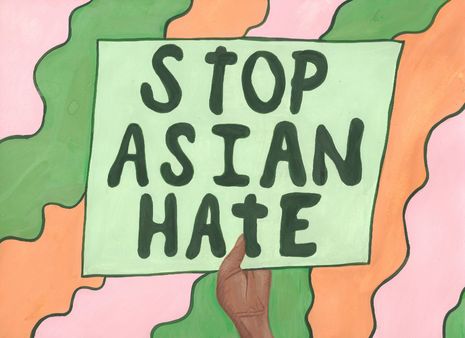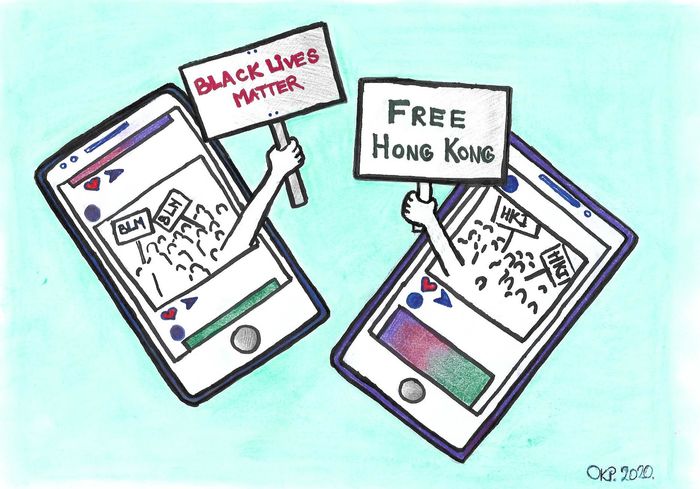Stop normalising racism towards Asians
After the rise of racist attacks on the Asian community, Fiona Wong reflects on her experience as an Asian woman living in the UK

Content Note: This article contains detailed discussion of racism
In light of the recent hate crimes towards South East and East Asians, I have found it difficult to stay silent about this issue. Statistics from UK police data suggest an increase of 300% in hate crimes towards those of East Asian heritage, but it must also be noted that not all cases have been reported. Racism towards Asians, particularly in the UK, has been in the shadows and ignored with the justification that it’s just “not as bad as in the US”. But the comments section of Boris Johnson’s ‘Happy Chinese New Year’ message was a constant stream of Asian hate rhetoric. I would like to express my disappointment in the fact that this has not been addressed at all, and at the lack of media coverage. Microaggressions are still part of everyday life for myself and many Asians alike, and are hidden behind the “model minority” myth. This was designed to divide minority groups, and it perpetuates the myth that Asians do not experience any real impactful incidents of racism. Racism should not be normalised, and it’s through my bottled-up experiences as a British-born Chinese person that I hope to show why. As an Asian woman, the past months have been very emotionally draining, and combined with the case of Sarah Everard, I feel exhausted and unsafe.
Throughout my life, racist comments have been culturally accepted, and in response, I would usually stay quiet, or try to laugh along, in the hope that the moment would pass quickly. But I never understood what to do in these situations, and being met with racially gaslighting comments is difficult to handle. However, the approval of others was far more important than how I really felt, as I never wanted to be labelled as “problematic”, “sensitive”, or someone who “can’t take a joke”. At school, despite the teachers having a seating plan, I had been mistaken for every East Asian girl, across different year groups, or even previous pupils who have left the school. I never wanted to have to worry about this. Any achievements were completely diminished with remarks such as “it’s because she’s Asian”. But people are individuals, and they work hard to get to where they are, so it’s frustrating to have that taken away.
“Racism towards Asians, particularly in the UK has been in the shadows and ignored”
My other fear was having to explain anything cultural about myself. It was difficult to embrace all parts of myself, when it was treated as something to be ashamed about. Asian features, particularly eyes and noses, are mocked in Western media, and I still have vivid memories of the time when I was asked why I have such a flat nose, which was followed by laughter, and questions of whether all Asians have a flat nose. What no one knew was that I had spent hours crying about it and tugging at my face in front of the mirror in hopes to get rid of those features. My mind was plagued with destructive thoughts, questioning why I was so ugly, and wondering if only I was white, then I would not have to deal with these comments. These thoughts were with me for years. I wish that I could tell my younger self that there wasn’t anything wrong with me, and that they were just being racist.
The truth is that parts of cultures are only deemed as acceptable if they are trendy, whilst everything else is negatively sensationalised. For example, the trend of “fox eyes”, endorsed by celebrities like Kendall Jenner and Bella Hadid, is ignorant of these experiences. The racially charged action of pulling your eyes is used to ridicule Asians and the context behind it should not and cannot be ignored. Seeing this on social media was uncomfortable, having to revisit those experiences. The idea that Asians can only have “slanty eyes” is associated with the “yellow peril”, which focused on villainizing Asians through cartoons, depicting them as a threat to the Western world. Hollywood is continuously perpetuating stereotypes, with men being at the bottom of the ladder of masculinity, and women being hyper-sexualised, there is no in-between in the objectification of Asians. Being called “exotic” is also not a compliment, nor is when someone says that Asians are their “type”. It’s a very dehumanising and uncomfortable experience.
I was more aware of racism at university, as my appearance meant that I was treated foremost as an international student. I wasn’t quite ugly anymore, but rather, I was promoted to being “pretty for an Asian”. To clarify, this racist sweeping statement homogenises the appearance of Asians, implying that all Asians are unattractive, which is not true. I have also received patronising comments about being able to speak English, from students and well as the general public. The most recent incident was a couple of weeks ago by a bus driver in Cambridge. Racial slurs such as being yelled “knee how” at, is also the most common phrase used as street harassment for me.
Racism is not new, but the past year has seen a dramatic rise in verbal and physical abuse towards South East and East Asians. As a reminder, last year Jonathan Mok, a student, was racially attacked, resulting in severe facial fractures which required surgery. In February, Peng Wang, a university lecturer, was attacked and left with facial and elbow injuries. These are stories which have made it into the media, but many are left unreported. It is heartbreaking to hear about these attacks, and each one has left me upset and angry, with the same frustrated feeling. Now, I fear for my own safety, and the safety of my family and friends.
“I hope that this article can also bring comfort to those who have experienced something similar”
I hope that through sharing my experiences, I can give a perspective and a voice to the racism that has been so minimised and normalised towards South East and East Asians. I have felt very alone in my experiences, so I hope that this article can also bring comfort to those who have experienced something similar. Finally, to anyone who is reading this, please do not stay silent. Instead, stand in support of anti-racism - being non-racist is not enough.
With thanks to Shu Lin, @dejashuu (Instagram), for a list of these resources:@nextshark@resonatevoices@besea.n@stopaapihate@dearasianyouthlondon@dearasianyouth
* Stop AAPI Hate:
* Safety tips: https://stopaapihate.org/resources/
* besea.n: https://www.besean.co.uk/ (grassroots movement for Britain’s East and South East Asians)
 Comment / The (Dys)functions of student politics at Cambridge19 January 2026
Comment / The (Dys)functions of student politics at Cambridge19 January 2026 News / Local business in trademark battle with Uni over use of ‘Cambridge’17 January 2026
News / Local business in trademark battle with Uni over use of ‘Cambridge’17 January 2026 Arts / Exploring Cambridge’s modernist architecture20 January 2026
Arts / Exploring Cambridge’s modernist architecture20 January 2026 Features / Exploring Cambridge’s past, present, and future18 January 2026
Features / Exploring Cambridge’s past, present, and future18 January 2026 News / Your Party protesters rally against US action in Venezuela19 January 2026
News / Your Party protesters rally against US action in Venezuela19 January 2026








